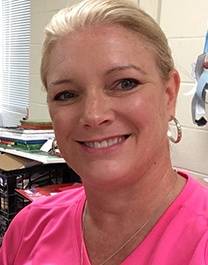
Katherine Rastrick
Working on assignment from her teacher Katherine Rastrick, Acadia Grantham constructed a video about speaking out against bullying and won second place in the 2017 IWitness Video Challenge.
Rastrick teaches 12th grade English and 10th-12th grade film and literature at the School of Biotechnology, Health and Public Administration at Olympic High School in North Carolina. She teaches about the Holocaust using Echoes and Reflections and IWitness as part of her effort to make the school a nationally recognized, ADL-designated No Place for Hate school.
The IWitness Video Challenge asks students to be inspired by testimonies of genocide survivors and witnesses to create positive change in their own communities and construct a video about their inspiration and project. Rastrick felt it matched her own goal to get her students to do something in the community that reflects social awareness and cross-cultural ideas, and it also tied in nicely with their school’s “senior exit project,” which is a community service and cultural awareness-based project required of all graduating students.
Her student Acadia launched a campaign via Instagram to encourage people around the world to speak out against bullying, inspired by a testimony clip of Holocaust survivor Kurt Messerschmidt.
Acadia’s project “blew her away” when she saw it, Rastrick said. She went above and beyond the minimum requirements of the project to reach out to people all over the world through social media and create a video that amazed the whole class.
The IWitness Video Challenge forced her students out of their comfort zone: to go out in their community, talk to people, and complete a project. Rastrick observed that this seemed to make her students more interested in learning about other people’s struggles and doing something to help them.
“I noticed that students were more empathetic towards other students, and they became leaders of making a change in our school’s climate and culture,” Rastrick said. “At first some of the students were resistant, but then once they starting talking about the project with their peers they really came up with some great ideas.”
While Acadia was the only winner in her class, Rastrick thought the rest of her students also did impactful work, and they passed on their enthusiasm for the IWitness Video Challenge to next year’s class.
Luckily for them, Rastrick is indeed planning on assigning the IWitness Video Challenge again next year.
“I will participate next year and beyond because this project is great at encouraging students to begin to make a difference and to get out there in their community and do something positive,” she said. “All of the students said that they really learned to communicate with others and really appreciated the differences in others more because of the project.”